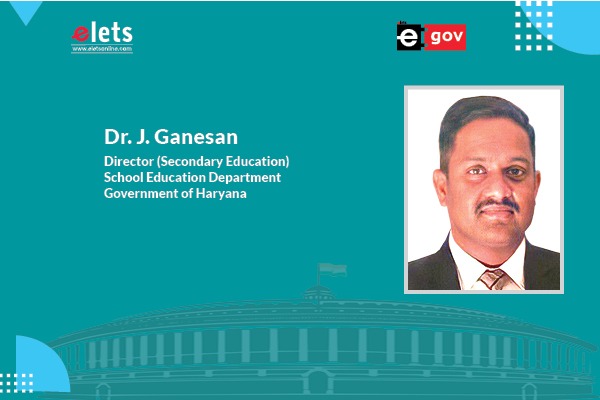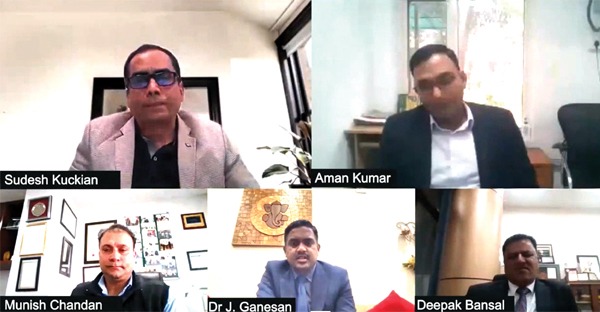
The digitisation of education and online learning platforms have given a facelift to the country’s education ecosystem. Hybrid classes and remote learning are models settling in as the new normal. Addressing such developments in Haryana’s context, Dr J Ganesan, Director (Secondary Education), School Education Department, Government of Haryana, spoke at the Elets Digital Governance Summit, Haryana Edition.
The Government of Haryana has always looked beyond academics and over the years there has been a noteworthy emphasis on vocational training. The National Education Policy (NEP) 2020 brings forth a greater role of vocational education and the Government of Haryana aligns with the policy. In the state-run government schools, there are about 1074 vocational labs. “As of now, we are training about 1.8 lakh children in 12 different vocations. In the past year, 90 of our students received placements, 20 got internships and 11 became entrepreneurs,” Dr Ganesan highlighted.


Looking at the positive trend towards entrepreneurship, the Government of Haryana has set up as many as 50 incubation centres in state government-run schools. Apart from the vocational training, the government schools are also teaching entrepreneurship to the students. “Also, in the upcoming year, we are in the process to provide toolkits to the students who pass out from the incubation centres. Thes kits will help them in setting up their businesses,” he added.
Also Read: Healthcare in Haryana Turning Digital

Expressing the significance of technology-related skills that will be essential in the times to come, Dr Ganesan said, “Besides vocational training, we are focusing on providing our students with 21st-century skills which include coding and robotics. As far as students in Haryana are considered, about 8000 of our students are learning python (coding language). They are being trained in designing software, art, games, applications, and more. In terms of robotics, we are teaching students robotics as a course in 137 Model Sanskriti Schools.”
UNICEF YuWaah is a programme where schools students are taught four 21st-century skills. Haryana is one of the very few states wherein about 2 lakh students have enrolled for this futuristic programme. As secondary education becomes the foundation for the future, apart from focussing on just academics, the state government have been constantly focussing on providing vocational skills and 21st-century skills to our students.
Addressing technology in education, he said, the COVID pandemic has revolutionised the traditional teaching-learning space. So the system has completely changed.
Technology has come to stay and it will be used in the future as well. During the COVID pandemic, the Government of India and the Haryana government brought out numerous initiatives under the PM E-Vidya Programme. “We launched many apps to ensure learning is continuous. One of the apps was ‘Awsar’ which we launched to help teachers & students connect online. It was delightful to see that the technology was immediately accepted by the government school teachers and students. Therefore, it assured that models like hybrid education are going to stay.”
About 20 lakh students from across rural Haryana have used Awsar for learning, practising, and taking assessments also. Almost 95 per cent of teachers in the state are logged into this system. Not only quizzes, but the schools were able to conduct three SATs through the system online. Moreover, Haryana was the only state in India to issue online progress cards online through the in-house-built application.
Also Read: Digital transformation in 2021 moving from remote to hybrid
“We have issued online progress cards to as many as 24 lakh govt school children, during the pandemic,” Dr Ganesan added.
Opening up on challenges that Haryana is facing in online education, he said, “One of the major challenges we faced was the unavailability of devices with the students. In most cases, students were dependent on their parents’ devices, meanwhile, at homes where there were siblings, they have no other choice but to share devices. This reduces the time spent by a student studying on a device. As a solution to this, the Government of Haryana took up the ambitious task of providing computing tablets to the students.
We have already placed orders for five lakh children which will be rolled out in August this year. Another nine lakh children will be provided with devices in the upcoming year.”
However, the government’s initiative is not restricted to just providing devices but academic content powered by a personalised and adaptive learning algorithm is also being provided. With this, students will be able to learn at their pace. Further, to ensure students are able to access online content, the government is also providing 2 GB of data to each student on a daily basis.
Be a part of Elets Collaborative Initiatives. Join Us for Upcoming Events and explore business opportunities. Like us on Facebook , connect with us on LinkedIn and follow us on Twitter, Instagram.











